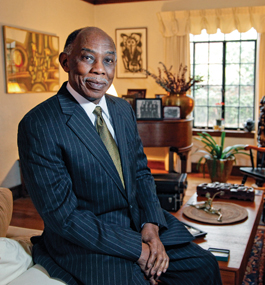Remembering Herman Hemingway ’53, Champion of Social Justice

Mike Lovett
Herman Hemingway ’53
“Throughout my life, I have believed that everyone has a sense of fairness and justice, and that the first step was to acknowledge one’s own belief in self and in the strength of one’s own truths,” Herman Hemingway ’53 told the Brandeis Alumni Association in 2020. “I have learned to fight for [these truths] regardless of the known or unknown consequences.”
Hemingway, who passed away in Boston on Dec. 14 at age 88, was the first Black man to graduate from Brandeis. Throughout his life, working as a public defender, an administrator of public housing programs, an architect of the Boston Human Rights Commission and chair of the criminal justice department at UMass Boston, he furthered the cause of social justice, fought racial prejudice and advocated for the poor.
“We stand on the shoulders of Herman Hemingway,” says Curtis Tearte ’73, vice chair of the Brandeis Board of Trustees.
Hemingway began working for social change early. “Even as a child, I was faced with having to survive in a society that considered me flawed,” he recalled. “At the age of 12, I marched in demonstrations against the racism that restricted folks that looked like me from fair housing, fair education, fair employment and competent health care.”
Harvard and Boston College offered him scholarships, yet Hemingway chose to study at Brandeis because he thought the young university was “innovative and exciting.” As an undergraduate, Hemingway met Martin Luther King Jr., then a graduate student at Boston University, through the Boston-area chapter of Alpha Phi Alpha, an intercollegiate all-Black fraternity to which both men belonged. Hemingway majored in Near Eastern and Judaic studies at Brandeis, then earned a law degree from Suffolk University.
Beginning his career as a public defender in the Roxbury and Chelsea, Massachusetts, district courts, Hemingway went on to open his own law practice, focusing on civil rights, and in the 1960s served as acting administrator of the Boston Housing Authority and assistant commissioner of housing inspection.
In the 1970s, he moved with his family to Nigeria, where he was a university lecturer on the American legal system. After his return to the U.S., he became a senior fellow at UMass Boston’s McCormack Institute, professor and chair of criminal justice at UMass Boston, and an adjunct professor at the Boston College and Boston University law schools. He was appointed professor emeritus at UMass Boston after 23 years of teaching.
Hemingway was predeceased by his wife, Barbara Bernice King, and daughter Angela. He is survived by his daughter Myra and three grandchildren.
